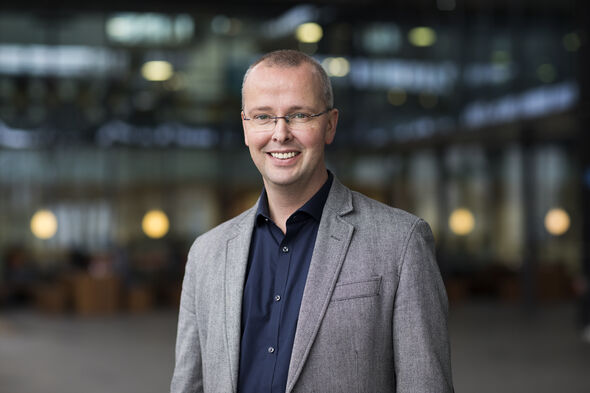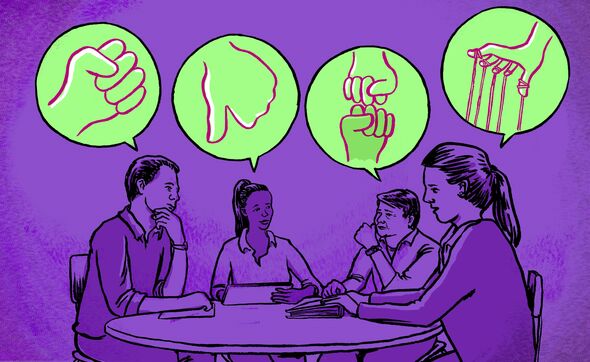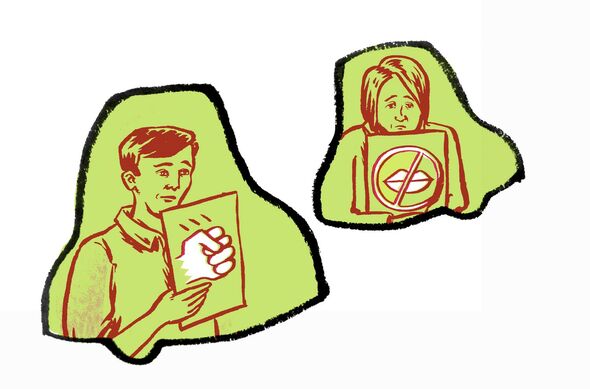“We have to increase the self-cleaning capacity of the university”
Undesired behavior at TU/e
Read more- The University , People
- 01/06/2021
“We have to increase the self-cleaning capacity of the university”
Cursor spoke to Remco Tuinier, professor of physical chemistry and member of the diversity committee. In this article he talks about undesirable behavior that he has observed at TU/e. He also spoke to some victims during that time. Tuinier shares his thoughts on solutions for the future. He has been working at TU/e since 2015, after a career at WUR, UU, NIZO, Forschungszentrum Jülich in Germany and DSM, giving him plenty of experiences to compare. The response of the Executive Board to these cases is to be found in a separate statement, below this article.
Is there any undesirable behavior at TU/e?
“Undesirable behavior is everywhere, but I thought the university was a relatively safe place. In the meantime, I have seen several situations at TU/e that certainly categorize as undesirable behavior. And the question is: how is it being dealt with? When it comes to the response to incidents and the aftermath, I thought things would have been organized better. There is still a lot to be gained with regard to how we should deal with this and I think that clear rules can prevent a lot of problems.”
Can you give an example of what you have experienced?
“Being very specific is difficult because I do not want to harm people, but it is a Dutch public secret that there has been a lot of unrest in our department (Chemical Engineering and Chemistry, ed.) because of a relationship between a professor and an employee in the direct hierarchical line. I have seen closely how the situation and the aftermath has had a huge impact on the colleagues in that group. Our research group has helped by taking on people, but I really missed the attention of the Executive Board towards the people. It conflicts with the good intentions they have, as rector Frank Baaijens emphasized in 2018 in response to #metoo.”
“The strange thing is that until 2014, the code of conduct for academic integrity (of the VSNU, signed by all universities, ed.) stated that it was undesirable that there were relationships in power relations (art 1.9), for example between student and lecturer, to avoid doubts about the objectivity of decisions or coercion and exploitation. This has been taken out in a revision (2018). ‘Why?,’ you wonder.”
Leiden University actually just added an article about this to ensure that such relationships are managed properly. The University of Amsterdam has also set additional, more specific rules in this area so that offenders can also be addressed formally. And a petition has been started within the University of Utrecht for a safer university.
Can't people who experience abuse just make use of the whistleblower policy?
Tuinier: “This is stated in the whistleblower policy: The Executive Board of Eindhoven University of Technology considers it desirable that, in the context of corporate governance, the university has a so-called whistleblower policy, or a scheme for reporting irregularities. Instead of ‘desirable’ it seems to me rather essential. And “in the context of corporate governance”?! Is that the motivation? That doesn't sound like an intrinsic force to call people to discuss problems. I don’t have faith that any random whistleblower can do so and stay unharmed. Recent research shows that exposing cases is not really encouraged.”
According to the Executive Board, the whistleblower scheme is intended for “serious abuse of a more organizational nature and not for cases concerning social safety. That's what the code of conduct for undesirable behavior is for,” the Executive Board states.
Why does Tuinier want to address this?
“I want to contribute to a more professional approach with clear rules and consequences with regard to undesirable behavior. And I advocate not only assessing scientists on scientific output and educational quality, but also looking at their behavior. And that also includes a stronger position of HR. The primary task of the university is to properly train people at all levels: BSc, MSc, PDEng students, PhD students and postdocs. The task of academic staff is to train these young people and help them in their learning process. And that must be done in a safe place. But in this system, PhD students and postdocs, as well as students, are very dependent on academic staff. PhD students are hardly or not at all asked how they experience their trajectory, but bachelor’s and master’s students (the university's customers) are. It is interesting to also ask those PhD students about this. But that requires us all to be more vulnerable. And that is difficult, I have seen. In addition, the system in which we operate leads to the aim of maximizing the number of PhD students. If you supervise too many people at the same time, this cannot be done without compromising the quality of the training. Let's strive for excellence in education and research and not quantity.”
The Dutch Network of Women Professors (LNVH) already published a report in 2019 on misbehavior and intimidation in science, where 53 (!) cases were cited. There, no one dared to speak up by their name. Does the university need to change course radically?
Tuinier: “This report by the LNVH also talks about the hierarchical structure as a facilitator for keeping undesirable behavior under wraps. Things have to change to eliminate this in the future. As the LNVH also states: the problems must first be recognized and undesirable behavior must have consequences. To get there, TU/e must set up black and white regulations for matters that fall under undesirable behavior. That is currently lacking and without regulations you cannot formally hold anyone accountable for anything.”
“In addition to describing that undesirable behavior in more detail, the reporting structure must change. You have to get rid of the hierarchical lines where you can only report problems with your boss, through your boss. At least two confidential counselors must be appointed per department. Two, so that you always have a spare if one of the two happens to be personally involved in your case. And there must also be an option outside the department, preferably with a neutral person. The universities could help each other well with that. I can imagine that, for example, a counselor who works at another university provides more neutrality. And it must be made clear to every new colleague and student what the rules are and what paths they must follow if they are treated unacceptably. And there must also be consequences for breaking the rules."
With regard to this, the Executive Board reports that if the 'boss' is part of the problem, or if he does not respond or does not respond adequately, there is nothing in the way of the person who wants to complain to contact the 'boss-of-the-boss'. "In addition, there are the confidential counselors, the HR advisor, the next-higher-level manager, the director of business operations, the organization’s social work, the occupational health and safety (OHS) supervisor, and for PhD students there is the PhD counselor," according to the Executive Board.
Professor Evangelia Demerouti, the Diversity Officer of TU/e and member of the diversity committee, sees the reporting of abuse as follows: “As far as I know, anyone can go to a counselor or HR to discuss such situations. She/he does not have to go to their supervisor. But in order to resolve the situation and after a formal complaint has been filed, the power dependence between the two people must be eliminated (if this is the case) and that does not happen systematically.”
The fact that these situations are not addressed is a reason for Demerouti to want change: “The procedure must be clear, and not wearing, because people to whom something like this happened are already in an emotional state. Victims should be advised to file a formal complaint if the situation does not appear to be resolvable. Action can only be taken in the event of formal complaints. But then the case needs to be looked at quickly by an independent person and the dependencies between victim and perpetrator should be eliminated while the process is ongoing (and probably after as well). Bystanders should also be able to file complaints, because victims do not always dare to do so themselves. And complaints committees must be independent and well trained on how they handle complaints/reports.”
There are rules, right?
Tuinier: “Yes, well, there are principles such as the TU/e Code of Conduct. We all signed those and when I occasionally chair a PhD promotion, I remind the young doctor of them. Such is the procedure. But you have to use the Code of Conduct actively and regularly repeat why those rules are important. They have to be kept in mind through a continuous campaign.”
“Let's take one of the points of this Code of Conduct: independence. As a scientist you have to be independent. And the Cursor editorial team is also formally independent. But how independent are we really? For example, there is a great dependence on the business community and we behave accordingly, otherwise we have a major financial problem because the government does not sufficiently finance the universities. To improve that, I agree with the ‘WOinActie’ (university activists, ed.), from which colleagues argue for more influence of scientists and teachers in the management of universities in the Netherlands.”
You indicate that the enormous workload and competition for academic staff is a risk. How does that lead to problems?
“I was asked to take over a substantial project because a (different) professor was leaving. I found out that the project had been brought in in a rather opportunistic way, which is an understatement, mind you. I have also expressed that in our organization, but that’s when you hit a wall. While I believe you should be open to discuss things so that we can learn from them for the future. If you get grants in a questionable way by being handy with data (he likes to explain this personally to the Executive Board, ed.), Then I think you are crossing a border. I had serious problems with that for years because the consortium of that project had far too high expectations of the research.”
“In my opinion, it is important to be careful when submitting claims in research proposals. In NWO proposals I see pipe dreams being created regularly. It is often stated in the research proposal; if I am allowed to do this research I will solve all these and these problems. When the money is in, NWO does not check whether those promises are being kept. It leads to undesirable situations, which in my opinion have to do with the enormous pressure on raising funding. This boosts the tendency to increase promises.
Rector Frank Baaijens comments on the claim that NWO never checks whether promises are kept: "That is not always true; Applied and Engineering Sciences (AES), a part of NWO, has supervisory committees, as well as other programs do. We really look at the results.”
“During my inaugural speech in 2016, I was critical of the competition that got out of hand when it comes to getting funding for research. I cannot separate it from the uncomfortable situations I have had to deal with that are related to undesirable behavior. And we all make mistakes from time to time. But there is little control and protection. And if things go wrong, most students, PhD students and postdocs don't know where to turn to.”
Does this have a link with the tasks of the diversity committee?
“When I became a member of the predecessor of this committee, Talent to the Top, Jan Mengelers asked the members to be ambassadors. So I've been trying to do that ever since. I now speak on my own behalf, but for me the activities of the diversity committee are aimed at striving for a more diverse and inclusive TU/e. It is often seen as a club that mainly wants to appoint more women, but it is much broader than that. In my view, a cultural change is needed in which desirable behavior is stimulated and undesirable behavior as mentioned and, for example, also racism and intimidation, is addressed. And it is also a good thing if this committee has a formally independent role from the Executive Board (the rector is now a member of this committee, ed.). ”
Is TU/e doing well?
“I myself have experienced a number of difficult situations that actually got me directly involved because colleagues asked for my help. I have to say that it bothered me a lot. In this corona period I started to reflect on it a bit more. But I feel supported by the people in our research group and a number of TU/e colleagues, also including some outside our department.”
“When I see the developments at our university, there are many inspiring elements to be observed. There is a huge number of talented young people on our campus, there are colleagues who conduct research at an international top level and there are great teachers. And on top of that you have all kinds of nice bells and whistles such as the new institutes. But a lot of work is needed at the foundation: we have to increase the self-cleaning capacity. The primary process of education and research must remain central and that is where things creak.”
In part 2 of this article, Cursor will share the experiences of four members of the TU/e community who suffered from undesirable behavior.
Statement by the Executive Board
Social safety is crucial for working and studying in a university. As Executive Board, we do not tolerate transgressive behavior, discrimination, racism, abuse of power or any other form of insecurity. We expect everyone at the university to feel the same way, and to act accordingly. We want to be an institution where everyone can develop themselves, get the best out of themselves and experience the space to do so.
To our regret, we see that this safety is not always a given and that we have to work on it continuously together. The stories that Cursor publishes concern behavior that crosses borders, behavior that we disapprove of. Especially the personally experienced racism and intimidation has shocked us deeply. We are therefore launching an independent investigation in order to clarify the facts, assess actions and make improvements.
As part of an integral approach to improving social safety, additional confidential advisors are recruited and it is decided to appoint an independent ombudsperson.
We apologize for those situations where things did not go well, in the portrayed cases, but also in cases where we are not aware of them. Cases in which colleagues or students have been treated unjustly, have been discriminated against or feel that they have not been heard. In situations where we do know of inappropriate or transgressive behavior, we act.
In addition to better design of formal structures, it is essential that we hold each other accountable, and speak up when things are not going well. Because we think it's important that everyone should feel at liberty to raise the alarm and when doing so is helped adequately.
Let's jointly ensure that our university is and remains a safe university. We can only do this together.
Executive Board
Robert-Jan Smits
Frank Baaijens
Nicole Ummelen
For the sake of completeness, please find here a reference to the possibilities of contacting confidential advisors and complaints committees within our university. More information about this is to be found on the intranet.



Discussion